FishProfiles.com Message Forums |
| faq | etiquette | register | my account | search | mailbox |
| Mystery Cory Thread | |
kitten  Fish Guru Meow? Posts: 2266 Kudos: 2194 Votes: 19 Registered: 18-Nov-2003   | I'm going to resurrect this thread, cause it's a cool thread to have.  Perhaps we should sticky it? In any case, I have an update on my cory which was tentatively labeled as ambiacus. He looks just like my agassazii now! I don't know if it's a color morphing "I wanna be part of the group!" thing or what, but he's almost identical to "Daddy." Perhaps we should sticky it? In any case, I have an update on my cory which was tentatively labeled as ambiacus. He looks just like my agassazii now! I don't know if it's a color morphing "I wanna be part of the group!" thing or what, but he's almost identical to "Daddy."Previous picture of "Izzy"  Daddy and Izzy today:  Daddy is the top one. I know you can't see all of Izzy, but trust me, they're nearly identical.  I hope you can at least make out the identifiable characteristics on Izzy... what cory do I have here? One who can't make up his mind! I hope you can at least make out the identifiable characteristics on Izzy... what cory do I have here? One who can't make up his mind!Edit: Oh, help... now it's been suggested that neither of them is Agassazii! Don't do this to me!  My brain can't keep up! My brain can't keep up![/font][/font] Last edited by kitten at 13-Sep-2005 20:53 ~Meow. Thus spoke the cat.~ |
Natalie               Ultimate Fish Guru Apolay Wayyioy Posts: 4499 Kudos: 3730 Votes: 348 Registered: 01-Feb-2003    | They are Corydoras ambiacus.  I'm not your neighbor, you Bakersfield trash. |
kitten  Fish Guru Meow? Posts: 2266 Kudos: 2194 Votes: 19 Registered: 18-Nov-2003   | B-b-b-but! But! I thought Daddy was Agassazii! And why did Izzy change so much?  I'm so confused now! No one ever protested Daddy's ID before. I'm so confused now! No one ever protested Daddy's ID before.  I thought I had a thread confirming Daddy's ID... can't find it though. Eeek... this is not cool. *mutters* *gets all dramatic* This changes everything! Everything, I tell you!  No, not really, it's just confusing  ~Meow. Thus spoke the cat.~ |
sirbooks                  Moderator Sociopath Posts: 3875 Kudos: 5164 Votes: 932 Registered: 26-Jul-2004    | I still say C. ambiacus, too. |
Calilasseia    *Ultimate Fish Guru* Panda Funster Posts: 5496 Kudos: 2828 Votes: 731 Registered: 10-Feb-2003   | Kitten, quite a few Corys undergo significant colour changes from fry to adult. As I discovered with my Pandas. Which are covered in black pepper dots until they're 10-12 weeks old. The most extreme example is Corydoras rabauti. Hunt down pictures of a juvenile and an adult, and they look TOTALLY different! Here are two adults spawning (T position): Adult rabauti This page shows (when you scroll down) a juvenile rabauti. Just take a look at the difference - it's the three-coloured black, orange and white fish, vertically divided, with NO sign of a back stripe at all! Because of this, the juvenile and adult were initially classified as two different species, namely C. rabauti and C. myersi until the truth was revealed during captive breeding. |
Janna  Mega Fish Posts: 1386 Registered: 24-Aug-2003   | And another I'm not completely sure about. I think it is C. reticulatus. Janna attached this image:  They wear masks of silk, porcelain, brass, and silver, So as not to mislead with their own, ordinary faces. |
Theresa_M            Moderator Queen of Zoom Posts: 3649 Kudos: 4280 Votes: 790 Registered: 04-Jan-2004    | Good idea for this thread  I already posted about mine [link=here]http://www.fishprofiles.com/files/forums/Bottom%20Feeder%20Frenzy/59101.html" style="COLOR: #FFCC99[/link] but never got a positive ID. Maybe someone looking at this thread will know. First pic is obviously the day I bought them. The next two were taken two weeks later. I wish I could get a better close up but with 10 cories in the tank it's playtime all day     [/font][/font][/font] [/font][/font][/font]~~~~~~~~~~~~ There is water at the bottom of the ocean |
NewBreeder16        Hobbyist Posts: 149 Kudos: 94 Votes: 16 Registered: 11-Feb-2005   | They'er salt and pepper corys or could be bandits.These two closely resemble one another  _______________________________________________ You can call me Newb too, since I'm not nere new any more. |
sirbooks                  Moderator Sociopath Posts: 3875 Kudos: 5164 Votes: 932 Registered: 26-Jul-2004    | No way. Corydoras paleatus and Corydoras me Looks like you have two different species there, and they are hard to pin down. I'm going to say that the left one (in the bag photo) is a C. delphax, and the one on the right is C. ambiacus. This is only tentative, but those are the closest ones I can see (apart from all the C numbers) from looking through bunches of species photos. |
kitten  Fish Guru Meow? Posts: 2266 Kudos: 2194 Votes: 19 Registered: 18-Nov-2003   | I've created separate threads, but never received firm identification on these lil guys. I'm official lonely cory rescuer  so I suppose I'll wind up with a bunch of cories needing to be ID'd, considering I usually only rescue rarer cories, usually mislabelled. (Rarer meaning that my LFS doesn't normally stock them. so I suppose I'll wind up with a bunch of cories needing to be ID'd, considering I usually only rescue rarer cories, usually mislabelled. (Rarer meaning that my LFS doesn't normally stock them.  ) )This guy is tentatively dubbed ambiacus, though I'd like confirmation of that... he was labelled agassazii, though he doesn't looke like my agassazii. Though... they must resemble each other enough, because the two tend to hang out.   This one was labelled "pygmy" cory, though he's obviously NOT that... the guy at the LFS netted him for me (again, he was the only cory left in his tank) and said, 'oh looks like a san juan *peers at name tag* but, I guess we're calling him pygmy!' Cali suggested elegans, nanus, and undulatus. "San Juan" seems to point to many different species: bilineatus, napoensis, bolivianus and even simply Corydoras san juan. It's confusing!   [/font] [/font]Previous threads: "ambiacus" "San Juan" Last edited by Kitten at 18-May-2005 12:53[/font] ~Meow. Thus spoke the cat.~ |
sirbooks                  Moderator Sociopath Posts: 3875 Kudos: 5164 Votes: 932 Registered: 26-Jul-2004    | The first one does look more like C. ambiacus than anything else. I'm going to rule out C. elegans for the second fish. It doesn't have any dorsal fin markings, while elegans cories have a bit of reticulation up there. Since the pictures are a little dark or the fish's side is obscured, it's tough to tell what the fish really is. However, I'm going with C. bilineatus. That looks closer to your mystery fish than all the others. |
Natalie               Ultimate Fish Guru Apolay Wayyioy Posts: 4499 Kudos: 3730 Votes: 348 Registered: 01-Feb-2003    | Here's my contribution...    Let's see y'all try and identify these guys. Even Ian Fuller couldn't.[/font][/font][/font]  I'm not your neighbor, you Bakersfield trash. |
sirbooks                  Moderator Sociopath Posts: 3875 Kudos: 5164 Votes: 932 Registered: 26-Jul-2004    | Oooooh yeah. I've seen them before. They look like elegans-type cories, but you already knew that.  Well, the best guess I have is C. elegans itself. I'm thinking that your fish might be a regional variation, because they do look a little different from the bulk of C. elegans cats out there. Sorry I can't be of more help.  |
So_Very_Sneaky             Ultimate Fish Guru Posts: 3238 Kudos: 2272 Votes: 201 Registered: 10-Mar-2004   | Heres mine- though they have been called Ambiacus, though they look much different from that one up there you guys said was ambiacus 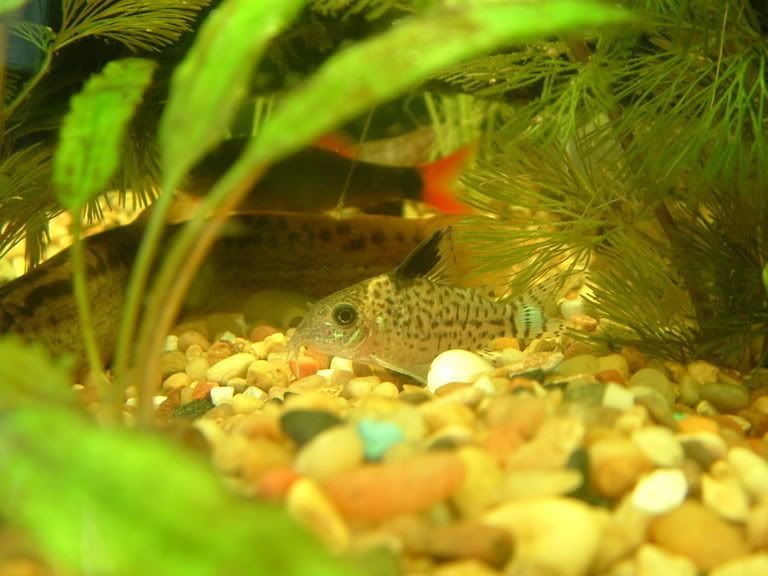 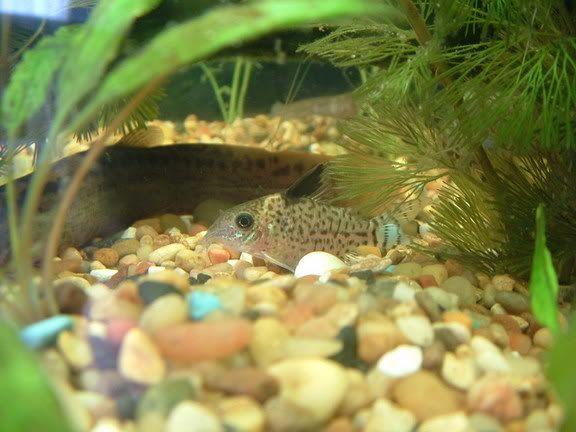 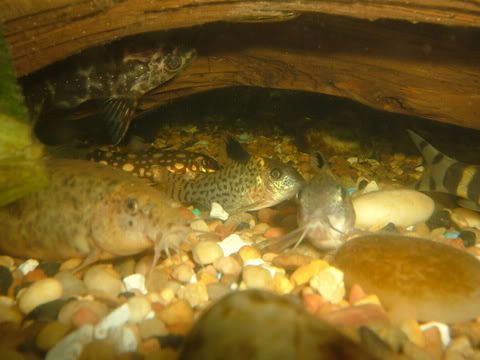 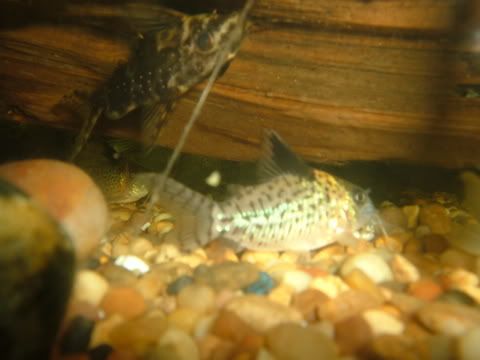 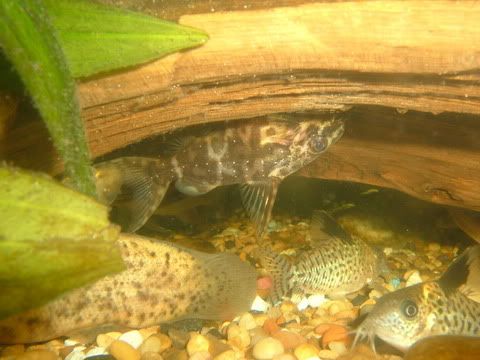 [/font][/font][/font][/font][/font] [/font][/font][/font][/font][/font]Come Play Yahtzee With Me! http://games.atari.com Http://www.myleague.com/yahtgames |
sirbooks                  Moderator Sociopath Posts: 3875 Kudos: 5164 Votes: 932 Registered: 26-Jul-2004    | Well, I do see your point. Most C. ambiacus cories have their side spots lined up in rows, while yours have somewhat more scattered spots. I'm thinking that your fish are either a variation of C. ambiacus]http://www.planetcatfish.com/catelog/callicht/corydora/461_1.php[/link], or [link=C103. The trouble with C103 is that they seem to have more spots than your cory. A single batch of Corydoras can have several cories that look different, even if they are all of the same species. Also, cories of one species caught in one river may look a little different than ones caught in another river. I'm still leaning towards C. ambiacus here, as I'm pretty sure that your fish are not C. agassizi, C. brevirostris, C. melanistius, C. leucomelas, C. delphax, C. ephippifer, C. saramaccensis or even C08. Last edited by sirbooks at 19-May-2005 13:02 |
Janna  Mega Fish Posts: 1386 Registered: 24-Aug-2003   | My mystery cories look very similar to Natalie's. I finally got some pictures! Janna attached this image:  They wear masks of silk, porcelain, brass, and silver, So as not to mislead with their own, ordinary faces. |
Janna  Mega Fish Posts: 1386 Registered: 24-Aug-2003   | Another: Janna attached this image:  They wear masks of silk, porcelain, brass, and silver, So as not to mislead with their own, ordinary faces. |
Janna  Mega Fish Posts: 1386 Registered: 24-Aug-2003   | Last one of this kind. I guess it is another C. elegans species. Janna attached this image:  They wear masks of silk, porcelain, brass, and silver, So as not to mislead with their own, ordinary faces. |
sirbooks                  Moderator Sociopath Posts: 3875 Kudos: 5164 Votes: 932 Registered: 26-Jul-2004    | If you can't identify one of your Corydoras catfish, post a picture of it here, along with any information you might have on its country and/or river of origin. Hopefully a well-wisher will be able to identify it for you.  It seems like quite a few members here don't know what their cories are, so maybe we can clear up some of these "mystery" cases. It seems like quite a few members here don't know what their cories are, so maybe we can clear up some of these "mystery" cases. Side shots are the most helpful in indentifying these catfish, and pictures should hopefully not be blurred. Since many Corydoras species look very similar to others, it is important for high quality photos to be available for identification. Otherwise, figuring out which species a fish might be is just guesswork. |
Natalie               Ultimate Fish Guru Apolay Wayyioy Posts: 4499 Kudos: 3730 Votes: 348 Registered: 01-Feb-2003    | Yep, those ones are C. reticulatus. Good find; nearly all "C. reticulatus" imported actually turn out to be C. sodalis.   I'm not your neighbor, you Bakersfield trash. |
sirbooks                  Moderator Sociopath Posts: 3875 Kudos: 5164 Votes: 932 Registered: 26-Jul-2004    | We have a C. reticulatis at work that came in as a contaminant in a shipment of C. sodalis.  That's what yours are, all right. That's what yours are, all right.I'm going to say that your mystery cories look like C. bilineatus. They are definitely another elegans-type (bunches of them in this thread  ), and the other elegans group cories don't match up as well. So, [link=C. bilineatus]http://www.planetcatfish.com/images/full/callichthyidae/corydoras/bilineatus/1.jpg" style="COLOR: #808080[/link]. ), and the other elegans group cories don't match up as well. So, [link=C. bilineatus]http://www.planetcatfish.com/images/full/callichthyidae/corydoras/bilineatus/1.jpg" style="COLOR: #808080[/link]. |
kitten  Fish Guru Meow? Posts: 2266 Kudos: 2194 Votes: 19 Registered: 18-Nov-2003   | Hmm... that's why I didn't think my cory was bilineatus... every bilineatus has brownish marking while my guy has black markings, though the markings themselves are similar. I dunno... it's confusing... I'll try to get better pics.  ~Meow. Thus spoke the cat.~ |
Natalie               Ultimate Fish Guru Apolay Wayyioy Posts: 4499 Kudos: 3730 Votes: 348 Registered: 01-Feb-2003    | Kitten, your cory looks more like C. nanus rather than C. bilineatus.   I'm not your neighbor, you Bakersfield trash. |
kitten  Fish Guru Meow? Posts: 2266 Kudos: 2194 Votes: 19 Registered: 18-Nov-2003   | Updated pic, for comparison's sake.  Kitten attached this image:  ~Meow. Thus spoke the cat.~ |
sirbooks                  Moderator Sociopath Posts: 3875 Kudos: 5164 Votes: 932 Registered: 26-Jul-2004    | Huh. You know, Natalie may be right in that your fish is a C. nanus. A difference between C. bilineatus and C. nanus is that bilineatus cories have more greenish side stripes, and C. nanus stripes are more brown/black. It's tough to tell from your earlier pictures, but the latest one shows more black on the stripes. If that's so, then C. nanus looks like the most attractive choice. Good call on that, o mighty addicted one.  |
houston              Fish Guru You want what when? Posts: 2623 Kudos: 2462 Votes: 337 Registered: 29-Mar-2003   | OH Goody, tomorrow when I have more of a brain I'll pull out my Corydora book again  It really does have excellent pictures and close ups to help identify zillions (ok not that many, but most, including the "C number" Corries It really does have excellent pictures and close ups to help identify zillions (ok not that many, but most, including the "C number" Corries  heidi heidi"I've got a great ambition to die of exhaustion rather than boredom." Thomas Carlyle |
Calilasseia    *Ultimate Fish Guru* Panda Funster Posts: 5496 Kudos: 2828 Votes: 731 Registered: 10-Feb-2003   | OK, putting this picture up means I'll probably have to edit this album entry AND my web page, but here goes  This was sold to me as Corydoras agassizii. Which it obviously isn't. ba This page also features geryi. The male looks quite a bit like my former aquarium inmate. Let's see if Sirbooks can wave the magic wand on this one  Last edited by Calilasseia at 20-May-2005 04:04 |
sirbooks                  Moderator Sociopath Posts: 3875 Kudos: 5164 Votes: 932 Registered: 26-Jul-2004    | I'm not able to view your picture (the school computers blocked your site), but I think it may still be a C. sodalis. C. sodalis http://www.aquaba http://www.aquanet.de/objimages/20040521122943802-hauptbild-210520041236433400.jpg As you can see, there is a little bit of reticulation in the dorsal fin, but there is no large black spot. You may have been thinking of C. reticulatus (see the last picture in Janna's above post), which looks the same but does have the black blotch. Sodalis cories are more common than the other similar species, which is why I'm leaning in that direction for now. Last edited by sirbooks at 20-May-2005 09:12 |
Calilasseia    *Ultimate Fish Guru* Panda Funster Posts: 5496 Kudos: 2828 Votes: 731 Registered: 10-Feb-2003   | Your school computers blocked an MSN Photo Album with no adult content? Pah. Net nannies. I despise them all. ]:| An alternative host for the picture is here. I did originally consider C. sodalis, but this is a species that I don't think appears that often in UK imports, and the Lambourne book's comments made me think of bolivianus as follows: C. bolivianus Nijssen & Isbrücker 1983 - first coll. G. Loubens 1982. Distribution: Bolivia: Beni - Rio Mamore. Max SL 65mm. C. bolivianus shares the same colour pattern as C. sodalis and C. reticulatus, but it is a much more robust species, and the reticulated colour pattern extends into the ventral region. All fins heavily pigmented, but dorsal fin blotch absent (this is present in C. reticulatus). Plus, the book says this about C. reticualtus: C. reticulatus Fraser-Brunner 1943 {Mosaic Corydoras} - described from aquarium specimen, but some of the first specimens collected W.G. Scherer 1935. Distribution: Brazil: Rio Amazonas at Monte Alegro; Peru: Loreto - Rio Ampiyacu, Rio Nanay. Max SL 65mm. C. reticulatus shares the same colour pattern with C. bolivianus and C. sodalis. C. reticulatus and C. sodalis are extremely variable in colour pattern: the body can be covered with small irregular dots and spots *or* large spots and blotches which link up to form a reticulated pattern - there is also a great variation in the reticulated pattern. The caudal fin can have 4-8 irregular vertical bars. In C. reticulatus the dorsal fin has irregular pigment and a black blotch (some specimens lack the irregular pigment, but the black blotch is always present). C. sodalis has scattered pigment in the dorsal fin and in some specimens this joins together to form 1 or 2 horizontal stripes. C. reticulatus is reported to have bred under aquarium conditions. And this about C. sodalis: C. sodalis Nijssen & Isbrücker 1986 - first coll. T. Hongslo 1971. Distribution: Peru: Loreto - Rio Yavari, Cano de Guavariba into Lago Matamata; Brazil: Amazonas - Costa de Capacete, Rio Solimões at Benjamin Constant. Max SL 65mm. C. sodalis shares the same colour pattern as C. reticulatus and C. bolivianus. This pattern is extremely variable. The upper half of the body may be covered with small irregular dots and spots, or large spots and blotches, which link up to form a reticulated pattern. (In C. bolivianus this pattern extends into the ventral region). Scattered pigment in the dorsal fin sometimes forms 1 or 2 horizontal stripes. (In C. reticulatus there is scattered pigment and a dark blotch on the dorsal fin, whereas in C. bolivianus, all the fins are heavily pigmented and there is no dorsal blotch). The caudal fin may be covered with small spots, forming up to 7 irregular vertical bars, but, in some specimens, the pigment may form oblique bars in a chevron-like pattern. The dark line along the junction of the body scutes (when present) can be either straight or zigzag and in some specimens, a broad unpigmented area is present above this line. Breeding: C. sodalis is known to have bred under aquarium conditions. The green iridescence that appears on C.geryi on PlanetCatfish also appeared on this fish under the right lighting conditions, and the desc  |
sirbooks                  Moderator Sociopath Posts: 3875 Kudos: 5164 Votes: 932 Registered: 26-Jul-2004    | Now that I can view your cory, I'm seeing some differences between it and C. geryi. For one, the lines of the reticulated pattern appear to be thicker on geryi cories than on your cory, which matches C. sodalis in this respect. Plus, the dorsal fin of male geryi cories looks taller than and has more reticulation than your cory’s dorsal, and those of C. sodalis. As a final point, the green sheen. I’ve seen a few sodalis cories that are capable of looking “green” when conditions are right. If yours is a sodalis as I think it is, it wouldn't be alone in feeling green.  C. sodalis Your cory C. geryi Hope that helps. Last edited by sirbooks at 20-May-2005 22:04 |
| Jump to: |
The views expressed on this page are the implied opinions of their respective authors.
Under no circumstances do the comments on this page represent the opinions of the staff of FishProfiles.com.
FishProfiles.com Forums, version 11.0
Mazeguy Smilies